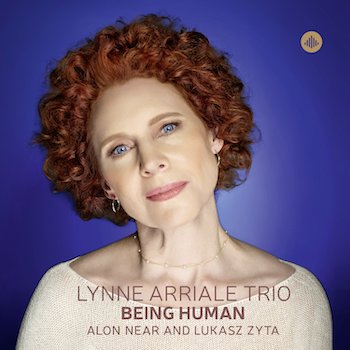Jazz Album Review: The Lynne Arriale Trio’s “Being Human” — An Expected Joy
By Michael Ullman
The dynamics of this splendid trio album, “a response to the division and turmoil in our world,” are gracefully balanced.
Lynne Arriale Trio, Being Human (Challenge)

I’ve been following the luminous playing and composing of pianist Lynne Arriale, heard here with bassist Alon Near and drummer Lukasz Zyta, since the ’90s. I remember sitting in Cambridge’s Regattabar, enthralled by the clarity and lyricism of her lines, distinctive yet also simple and accessible. The pianist is an educator as well as a performer: she is the Professor of Jazz Studies and Director of Small Ensembles at the University of North Florida.
Arriale is currently touring in support of her new disc, Being Human, which, by my count, is her seventeenth. This suite of ten pieces (one, “Love,” is heard in two versions) is an expected joy. The pianist describes the motivation behind the recording in her notes: “I wrote this suite in response to the division and turmoil in our world. The music focuses on qualities we all share: that define our humanity. I hope this album will be uplifting and convey a sense of unity and optimism.”
Each number has a dedicatee. (“Love” is dedicated to humankind.) The opener is “Passion,” written for the major environmentalist, Greta Thunberg. The tune begins with a series of repeated chords that modulate. Then, after a pause, Arriale spins off into a sweet, light-hearted version of the sequence. Her take on passion is delicate. After laying out her melody, the pianist solos, with bassist Near poking his way into the conversation. There’s a graceful balance in the dynamics of this trio. “Courage” is dedicated to the Ukrainian people. Its melody plays with time via carefully placed pauses: drummer Zyta’s adroit accompaniment is crucial here. The idea of courage is suggested, I believe, as the intensity of Arriale’s playing slowly gathers increasing force. “Faith” is Arriale’s version of gospel music — a few crushed, blue-ish notes intimate soulfulness. I came away from the track humming the melody.
Arriale draws on a wide range of influences, to the point that her notes provide a kind of education. There’s humor in this set as well. After the hymn-like “Faith,” Arriale offers the antic, cat-like leaps of “Curiosity,” which is dedicated to the autistic mathematician and physicist Jacob Barnett, who was twenty-five when she wrote the piece. Barnett’s view of the universe may not be entirely whimsical: in the last minute of this three minute piece, Arriale wanders, star-struck, into space, playing freely. “Soul” is not what one might expect by the title. It is dedicated to Amanda Gorman, the poet who recited her “The Hill We Climb” from the steps of the Capitol at the inauguration of Joe Biden on January 20, 2021. Her poem, like the music it inspired, is designed to promote unity.
“Persistence,” a crucial quality in this list of human traits, is dedicated to Malala Yousafzai, a Pakistani woman who fought for the education of women. She became the youngest person to ever win the Nobel Prize. Here Arriale’s music is agitated and strong. Its melody descends, picks itself up, and repeats the process. The pianist’s solo is largely single notes that stand out starkly above the left hand chords. The slow ballad “Gratitude” is dedicated to the surprisingly productive life of a young man who suffered from a neuromuscular disorder that crippled him and took his life at the age of 13. Somehow Mattie Stepanak wrote six books of poems (by 13!) and “radiated a positive spirit of gratitude.” The poignancy of that piece is followed by the upbeat “Joy,” a modified calypso. “Love”s beautifully rendered simplicity — a kind of melodic stroll — is instantly memorable. Arriale’s performance with the trio emphasizes the music’s peacefulness, though the coda ends with the splashing cymbals of Zyta. At the end of the set, “Love” is reprised. The pianist explains: “I close the album with a reprise of “Love,” played with ‘voices’ on the Yamaha Clavinova. This is my way of saying to our listeners, ‘I send you my love.’
Michael Ullman studied classical clarinet and was educated at Harvard, from which he received a PhD in English. The author or co-author of two books on jazz, he has written on jazz and classical music for the Atlantic Monthly, New Republic, High Fidelity, Stereophile, Boston Phoenix, Boston Globe, and other venues. His articles on Dickens, Joyce, Kipling, and others have appeared in academic journals. For over 20 years, he has written a bimonthly jazz column for Fanfare Magazine, for which he also reviews classical music. At Tufts University, he teaches mostly modernist writers in the English Department and jazz and blues history in the Music Department. He plays piano badly.

You can always tell it’s Arriale in about five notes from her distinctive touch alone. I love her way with a melody.